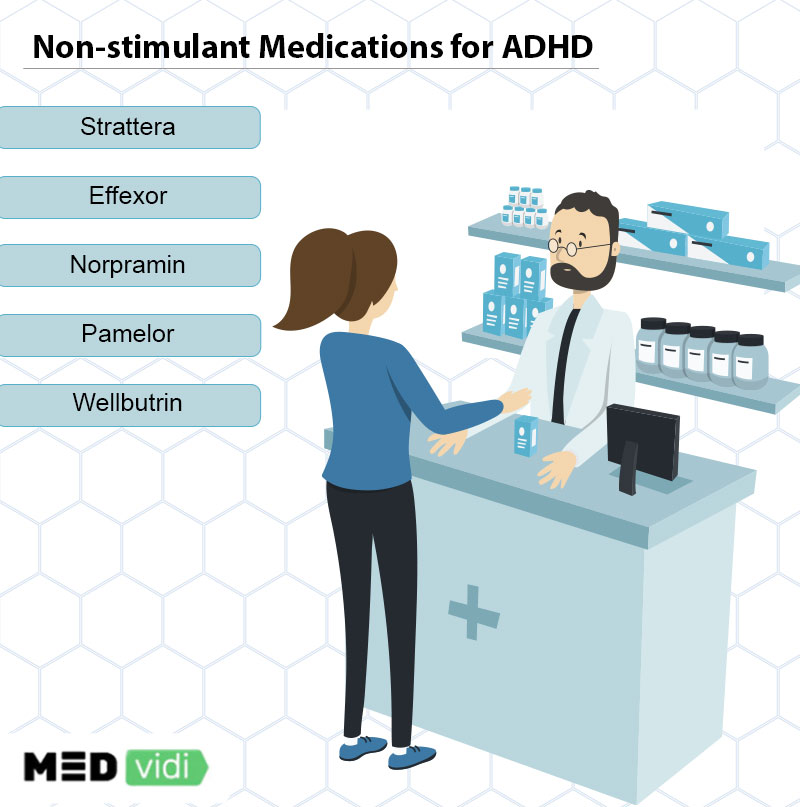For some people with ADHD, stimulants may not be as helpful as expected. In that instance, non-stimulant ADHD medications can be used along with stimulants or instead of them. Non-stimulant medications have fewer side effects and are also favored if someone has a prolonged history of addiction.
Even though stimulant and non-stimulant meds help manage the same symptoms, they do it in different ways. From this post, you’ll learn more about the mechanism of action of these medications and how exactly they help people with ADHD.
The ADHD treatment and medication you need are only a click away.
How Do Non-stimulants Help ADHD?
If a patient with ADHD doesn’t react to stimulant medication or experiences too many adverse effects, non-stimulants are a second-line treatment option. Non-stimulant drugs achieve the same improvements as stimulants: they reduce the signs and symptoms of ADHD, particularly impulsivity and aggression.
Non-stimulant ADHD meds take one to six weeks to show their full effects. They activate the prefrontal cortex (which controls thoughts, conduct, and emotions) and improve its connection with other brain regions. This facilitates concentration in adults and lessens impulsivity and hyperactivity. Also, the drug’s effectiveness is indicated by sustained focus, elevated mood, increased attention to detail, improved memory, and better sleep.
Changing ADHD Medication: Stimulants vs. Non-stimulants
The same dosage of ADHD medication may not always be the best choice for some patients. Sometimes, the medication needs to be adjusted even more than once. Finding the ideal dose and timing can take a few weeks or longer. But if those adjustments are insufficient, your doctor might decide to switch medication within the class or choose a medicine of another type. That could be a shift from a stimulant to a non-stimulant or vice versa.
The following information will help you better understand the differences between stimulants and non-stimulants before you switch between them.
| ADHD Stimulants | ADHD Non-stimulants |
|
|
The only person authorized to change a patient’s medicine is a medical expert. To make the best selection regarding your medication, seek professional guidance.
FDA-approved Non-stimulant ADHD Medications for Adults
Based on their effects on the brain, non-stimulant drugs can be further divided into alpha agonists and norepinephrine modulators. Both have received FDA approval for the treatment of ADHD patients. The following list contains the best non-stimulant ADHD medications for adults meaning they are most frequently prescribed being FDA-approved options:
- Atomoxetine (Strattera). It appears to increase the levels of norepinephrine, an important brain neurotransmitter. Atomoxetine (
Strattera[1] ) helps lengthen a person’s attention span and reduce hyperactivity and impulsive behavior. - Clonidine (
Kapvay[2] ). It is an alpha agonist. This drug was initially created to decrease adult patients’ high blood pressure by reducing sympathetic outflow from the nervous system. Clonidine has also been found to lessen impulsivity and hyperactivity while increasing focus through its effects on the prefrontal cortex area of the brain. - Guanfacine (Intuniv). Guanfacine lowers heart rate and relaxes blood vessels to allow for easier blood flow throughout the body, which is how it was first manufactured for high blood pressure. ADHD may be treated with extended-release tablets of Guanfacine (
Intuniv[3] ) by influencing the area of the brain that regulates attention and impulsivity. - Viloxazine (
Qelbree[4] ). In April 2021, the FDA approved the new drug viloxazine for treating ADHD. It is a norepinephrine reuptake inhibitor, similar to atomoxetine, which modifies the level of norepinephrine in the brain by preventing its clearance.

Other Non-stimulant Medications for ADHD
Other non-stimulant medications fall into various categories aside from those FDA-approved for use:
- Antidepressants. The ADHD brain has low levels of the neurotransmitters dopamine and norepinephrine, both of which can be increased by antidepressants. Because of this, some doctors prescribe these medications “off-label” to treat the symptoms of ADHD. The most common option is
Bupropion (Wellbutrin)[5] . Nonetheless, they are typically less successful than Strattera or other stimulant and non-stimulant drugs. - Medications that promote wakefulness. Although the FDA has not approved wakefulness-promoting drugs, such as
modafinil (Provigil)[6] to treat ADHD, some doctors still prescribe them because of their similar physiological actions. However, there isn’t enough solid proof to support the claim that these medications can effectively reduce ADHD symptoms. - Medicines that fight viruses. Amantadine (Symmetrel), an antiviral drug that is used to treat Parkinson’s disease symptoms, including tremors, is believed to function by promoting dopamine production. Increased dopamine can also help with ADHD symptoms; some physicians prescribe it off-label to address ADHD symptoms.
Note: Only a physician or other mental health professional can prescribe you the appropriate prescription; the information about the medications offered here is for informational purposes only.
To Sum Up
Non-stimulant ADHD medications have several advantages over stimulants, including the absence of side effects like agitation, insomnia, and decreased hunger. Additionally, they have a more enduring and gradual effect than many stimulants that can start working and then stop quickly. Above all, due to their minimal risk of abuse or addiction, non-stimulants in certain cases are favored over stimulants.
Consult a healthcare professional to ensure that you choose the appropriate medication. The ADHD specialists at MEDvidi can recommend the appropriate medicine for you based on your symptoms and unique characteristics.













